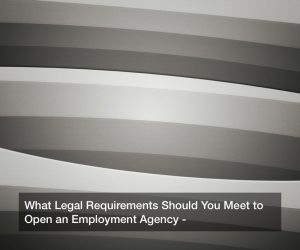
Does your employment agency honor discriminatory employer preferences? Is your staffing agency running under proper licensure? Do your employment agencies follow all state and federal employment agency rules and regulations? These are some of the questions that should bug any person or group that runs an employment agency. All staffing agencies should be constituted and licensed to operate as set in the federal and state laws.
This post presents to you the most important legal requirements that you should meet to run a staffing agency.
What Do Staffing Agencies Do?
Private employment agencies are corporations or registered and licensed individuals who connect employers to qualified prospective employees. The staffing agencies provide skilled employees for some contract, temporary, and permanent jobs. When employment agencies provide contract or temporary positions, then the workers doing such jobs either work as employees of the agency or independent contractors. As such, these workers are not considered as employees of the company offering the job.
Legal Requirements that You Should Meet to Run Employment Agencies
Starting a staffing agency is an easy task if you have all the necessary resources and financial power. The number of licenses and requirements that you’ll need to meet is also a few, but they’re vital to the running of the agency. Here are some of the legal requirements that you’ll need to meet.
A Legal Business Structure
Like any other business organization, your temp agency should have a legal business structure. Your employment agency needs to have a corporate entity to safeguard you and your partners from legal liabilities. The liabilities may result from the omissions and errors committed by placed employees. If your recruitment company chooses to have a corporate or partnership structure, then it has to charter its business with the Secretary of State. But the structure of your agency can be chartered in another state and not your state of operation.
Registration of the Business at the State Level
Once you have your legal business structure, you’ll have to register your business operations within the state that you’ll operate. Registration requirements vary across state borders. You’ll also need some registration fee to complete the process. After registration, you should get a state tax identification number. You’ll use this number when paying business taxes and employee and staff withholdings.
Insurance Policy for the Agency
Business insurance policies can help to protect your employment agencies from liability. It also helps your company to meet the legal requirements on insurance matters. Your business needs worker’s compensation cover for your full-time employees and general liability insurance. When providing long-term placement services, your placed workers are long-term employees of your recruitment agency. As such, they’ll need some workers’ compensation coverage under your agency.
The Equal Employment Opportunity Commission (EEOC) Requirements
Your agency should avoid unlawful employee referral practices. You should also avoid all discriminatory practices when placing or hiring employees. You also shouldn’t honor unfair employment practices that favor prospective employees because of age, race, gender, nationality, or religion.
Specialty Staffing Licensure and Registration
Most employment agencies focus on providing services to all industries. But some states need specialty job agencies to work in specific industries. For instance, your agency may get a license to operate as a specialty nursing employment agency. Such agencies only deal with nursing professionals. If this is the rule in your state, then you should seek for the appropriate licenses to operate as a specialty job agency.
There are other jurisdiction-based requirements relating to fringe benefits, working hours, the listing of positions, the payment of fees, and the disclosure of compensation. You should thus ensure that your clients get the best from your agency in all these areas. You can even start an employee recognition program for your temporary placements to improve employee morale. Such plans work well because studies show that 86% of companies with such recognition programs record better employee happiness. But never forget to meet all the stipulated legal standards.
